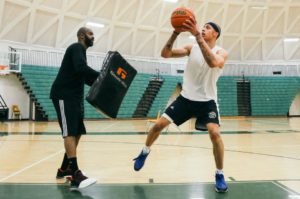This story originally ran on ESPNW
By Mirin Fader 
Madison Holleran. All Lanesha Reagan could think about was Madison Holleran, the University of Pennsylvania track athlete.
Reagan, Oregon State volleyball’s 5-foot-10 starting outside hitter, known for her power and pogo-stick bounce, lay in her bed in her freshman dorm and combed through Holleran’s story. Madison seemed to be gifted, kind, competitive. A budding track star, a daughter, a friend. Even a banana-and-peanut-butter aficionado. Few knew she struggled with depression and the pressures of social media.
On Jan. 17, 2014, Holleran leaped off the ninth level of a parking garage in Philadelphia. She died at 19.
Reagan shivered. Images of her own life swirled around her head: years of masking her pain, years of blocking out her shame, years of wishing she inhabited a body other than her own.
“I am so sick of feeling alone and helpless. Mental illness is not something you should be ashamed of but breaking down that stigma starts with us, the student-athletes. We can change the culture and make it easier for our friends and teammates to get the help that they need.”
“That honestly could have been me,” Reagan said. “If things would have been different … I have no doubt in my mind that that could have been me.”
Reagan, who will be a senior next season, remembered this moment as she typed until she couldn’t type anymore in early January. Few knew she was about to post: “Being a Student-Athlete and Living with Mental Illness.” Not her grandparents, Dorothy and Patrick Reagan, who raised her; not her best friend, Ellen Anderson, the peanut butter to her jelly since age 4.
Reagan didn’t want to sound ungrateful for her Division I athletic scholarship. She didn’t want to alter anyone’s image of her: outgoing, smart, warm, bold. Passionate about her English major and writing minor, books and Beyoncé. A shoulder to cry on and the life of the party. “You know when Lanesha walks into a room,” said McKenna Hollingsworth, a junior setter/outside hitter. Reagan’s radiance caused her preschool teachers to call her “Miss Sunshine.”
But Reagan had to speak her truth. Not for herself, but for others.
“I am so sick of feeling alone and helpless,” Reagan wrote in her post. “Mental illness is not something you should be ashamed of but breaking down that stigma starts with us, the student-athletes. We can change the culture and make it easier for our friends and teammates to get the help that they need.”
‘I want to be alive’
At age 13, Reagan dreamed of becoming a Division I volleyball player. But she also thrived in martial arts, ballet, horseback riding, dancing, ice skating, singing. “Lanesha was very driven on her own,” Dorothy said. “She was blessed physically to be an extraordinary athlete no matter what sport she chose.”
She devoured books in one sitting and wrote short stories in her journals, later serving as editor of Snohomish (Washington) High School’s student newspaper, The Arrowhead. She was crowned homecoming princess. She threw elaborate parties, including one on Halloween with more than 100 classmates. Reagan and her friends dressed up as different hot sauces from Taco Bell, like “verde,” “hot” and “spicy.” Reagan was “fire.”
Reagan’s 36-inch vertical jump — higher than the average NBA player — wowed spectators. She had a knack for hanging a little bit longer, as if the pocket of air opened just for her. Opponents would duck and dodge her hits. She was named an American Volleyball Coaches Association/MaxPreps Under Armour All-American and verbally committed to Oregon State as a sophomore.
“I didn’t have to push her to work harder because she was outrunning everybody in the gym all the time,” Snohomish coach Alex Tarin said. She had to, having received her first Division I letter in eighth grade, with tons more hunting after her freshman year. The pressure pierced her.
“She was really the star of the school. Everybody knew her name, was saying her name,” Anderson said. “It always kind of got in her way of her love for volleyball because she was always having to be this perfect image that everyone wanted her to be.”
Reagan held a different image of herself. She remembers suffering from depression by the end of seventh grade. She felt alone and didn’t think anyone would understand. It didn’t help that her classmates in Snohomish, which is an overwhelmingly white city, taunted her mixed identity (Reagan is half African-American and half white): “You’re not really black. You don’t act black.”
Developing muscles to complement her athletic frame, Reagan longed to shrink into her friends’ petite bodies and jump out of her own. She never felt comfortable in the tight jerseys, the spandex. She’d stare at herself in the mirror, disgusted, pinching her skin. She developed an eating disorder, a mix of anorexia and bulimia — the latter became the bigger struggle. She ingested just enough Honey Nut Cheerios and Gatorade to survive practice. Yet she craved those two hours because she could jump and hit and block and not think about anything else.
By eighth grade, she began cutting on her upper hips with razor blades she removed from her shavers. Once she cut all over her stomach and didn’t realize it until she was done; it happened so quickly. “I was just numb to feeling,” Reagan said. “I wanted to feel something and that was the only way I could.” She willed herself to become a mountain: tall, strong, solid, and no matter the snow, hail or rain that enveloped her, she would shine. “I just knew that I had to always be happy,” Reagan said.
Read the rest of the story on ESPN.com.







 By Luke Cooper
By Luke Cooper